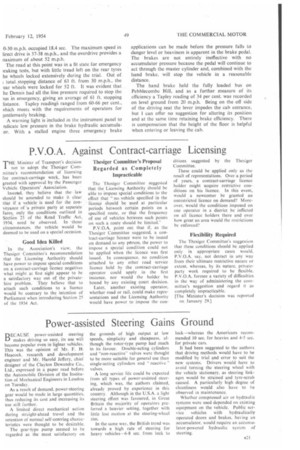P.V.O.A. Against Contract-carriage Licensing T HE Minister of Transport's decision not
Page 55

If you've noticed an error in this article please click here to report it so we can fix it.
to adopt the Thesiger Committee's recommendation of licensing or contract-carriage work, has been greeted with approval by the Passenger
Vehicle Operators' Association. • Instesd, they believe that the law should be amended to make it clear that if a vehicle is used for the conveyance of 'a private party at separate fares, only the conditions outlined in Section 25 of the Road Traffic Act, 1934, need be observed. In -those circumstances, the vehicle would he deemed to be used on a special occasion.
Good Idea Killed.
In the Association's view, the Thesiger Committee's recomm endat ion that the Licensing Authority should have power to impose special conditions on a contract-carriage licence negatives what might at first sight appear to be a satisfactory way out of the privatehire problem. They believe that to attach such conditions to a licence would he contrary to the intention of Parliament when introducing Section 25 of the 1934 Act. Thesiger Committee's Proposal Regarded as Completely Impracticable The Thesiger Committee _suggested that the Licensing Authority should be able to impose special conditions to the effect that "no. vehicle specified in the licence should be used at particular periods between certain points on a specified route, or that the frequency of use of vehicles between such points on such a route should be limited."
P.V.O.A. point out that if, as the Thesiger Committee suggested, a contract-carriage licence were to be issued on demand. to any person, the power to impose a special condition could not be applied when the licence was first issued. In consequence, no condition attached to any other road service licence held by the contract-carriage operator could apply in the first instance, nor would the holder be bound by any existing court decision.
Later, another existing operator, whether road or rail, could make representations and the Licensing Authority would have power to impose the con
ditions suggested by the Thcsiger Committee.
These could be applied only as the result of representations. Over a period of years, a contract-carriage licence holder might acquire restrictive conditions on his licence. In this event, would a newcomer be granted an unrestricted licence on demand? Moreover, would the conditions imposed on one operator in a district be inflicted on all licence holders there and over how great an area would the restrictions be enforced?
Flexibility Required
The Thesiger Committee's suggestion that these conditions should be applied only in appropriate cases would, P.V.O.A. say, not detract in any way from their ultimate restrictive nature or extent, whereas, by its nature, privateparty work required to be flexible. P.V.O.A. foresee a variety of difficulties in the way of administering the committee's suggestion and regard it as completely impracticable.
[The Minister's decision was reported on January 29]




































































































